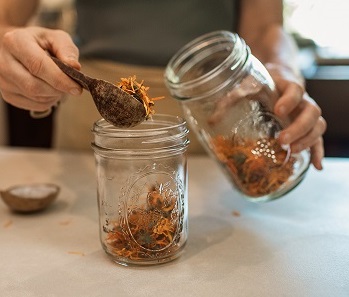Want to make your own herbal medicine at home but don’t want to break the bank to do it?! This is my first post in a 3 part series on how to practice herbalism on budget. I’ve left some of the more obvious tips for now – so some of these might surprise you. Here’s my top 5 places to start:
- Get to know your fear
Fear often drives our decisions, but this can lead us to make impulsive purchases which stretch our budgets. This is easier said than done, as I know from personal experience. When I was in the thick of a really challenging health issue, I was desperate for anything that’d help me get better – but so much of it I didn’t need and didn’t help. It is a journey though, to figure out what helps and not, but if you need to practice herbalism on a budget, I really recommend getting familiar with your inner world and making friends with fear, or grief (and hope) or whatever else you might find.
2. Don’t mistake common for ineffective
We’re awash with information on fabulous, and often exotic herbs. This is a blessing, but they can come with a hefty price tag. Don’t forget, our bog standard, common herbs are very powerful medicine, ones that have stood the test of time which is why they’re so culturally familiar. Thyme, rosemary, sage, cinnamon, turmeric, black pepper. They’re affordable, many are easy to grow and can support many everyday health issues that crop up in our homes.
3. Needs vs wants
I’ll be the first to admit that when it comes to health, this can be very hard. In our modern consumer wellness environment, luxuries seem to have been reassigned as basic needs – basic human rights almost. When we through our fears on top, we’ve got a perfect storm creating an endless spending vortex that can subsume our incomes.
But, if we want to practice herbalism on a budget, being able to distinguish needs from wants is a crucial skill that can lead to greater financial stability and overall well-being. Needs are essential for survival. Distinguishing needs from wants involves recognizing the difference between what is necessary for our basic needs and what is simply desired or preferred.
Please know – this will look different for everyone. What’s a want for someone, will be necessary to someone else because we’ve all got different constitutions, health histories, personalities etc. With health and wellness, especially when practicing herbalism on a budget, we really need to pay attention to ourselves and what WE need, not what someone else does.
4. Community is your superpower
Whilst I generally don’t like mega corporations and big factories, they’ve at least highlighted how to gain efficiencies – that’s making the same thing over and over again. We can adopt this on a small scale to help us make herbalism more affordable on a budget.
Rather than each of us having to stock up on everything individually, I can ‘specialise’ in a certain remedy or grow a certain herb and then swap with friends who grow and make other things. ie. making a big batch of elderberry syrup takes the same amount of time as a batch just for my family. And my patch of catnip has plenty to share, and perhaps then I can swap for lemon balm (which somehow never grows well for me!)
This approach saves time, money and encourages community and deeper, mutual relationships – which is win-win-win in my book.
5. Work out what’s more affordable for you
I wanted to give a list of the cheaper remedies to make, but honestly, it in part depends what you have access to, and what you need. So rather than being another online herbalist who gives out generic lists, I encourage you to reflect on what you’ve got access to and crunch the numbers on what’s cheapest for you.
For example, I’m a home beekeeper, so making remedies with honey is economical for me. If you’ve got to buy your own local raw honey however, that might make it more expensive. BUT, if you’re already using honey in your life, maybe supercharging it with herbs makes it work double – both as your preferred sweetener and as your herbal medicine.
AS a general rule, water is known as the “universal solvent” – meaning it’s really effective for a wide variety of herbs and constituents. So the humble old pot of tea might really be your most affordable and effective solution.
Tinctures in general are really expensive to make at home because of the alcohol (and depending on the herb can be less effective at extracting the medicinal constituents if a particular herb needs a higher concentration of ethanol than you’ll find in a regular vodka). Perhaps you’ll swap expensive tinctures for teas, or you might find vinegar is more affordable for you – especially if you’re a bit of a homesteader and want to make your own apple cider vinegar from apple scraps!
These are just a few ideas for how you can start to practice herbalism on a budget. I’d love to know if you’ve found them useful, or any of them have stood out to you.
I’ve got plenty more practical tips coming in part 2. Stay tuned!


